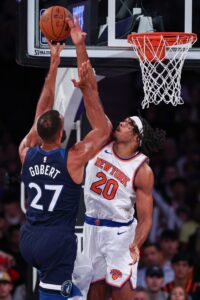As we explain in our glossary entry, the NBA’s minimum salary exception doesn’t just allow over-the-cap teams to sign players to minimum salary contracts. It also allows clubs to trade for players earning the minimum without having to send out any matching salary.
As long as the player’s salary doesn’t push a team’s salary above its hard cap, any club is permitted to use the minimum salary exception to acquire a player via trade, regardless of its proximity to the tax aprons.
However, not every player earning the minimum can be acquired using the minimum salary exception. Essentially, any contract that couldn’t have been signed using the minimum salary exception also can’t be acquired using the exception.
For instance, since the exception only allows teams to sign players to one- or two-year contracts, similar rules apply in trades. A team can’t use the minimum salary exception to acquire a player on a three- or four-year contract, even if he’s earning the minimum. If a player signs a two-year contract that exceeds the minimum in year one and is worth the minimum in year two, he’s ineligible to be acquired using the minimum salary exception.
 What does that mean in practical terms? Let’s use Knicks center Jericho Sims as an example, since his name has come up as a possible trade candidate.
What does that mean in practical terms? Let’s use Knicks center Jericho Sims as an example, since his name has come up as a possible trade candidate.
Sims is earning $2,092,344 this season, which is his minimum salary based on the contract he signed in 2022. Since he’s currently in the third season of a three-year contract though, a team acquiring him can’t absorb his salary using the minimum salary exception.
That team, assuming it’s over the cap, would either have to send out a player to match Sims’ $2,092,344 salary or use an exception to take it on — it wouldn’t necessarily have to be a trade exception, since the non-taxpayer mid-level exception, bi-annual exception, or room exception could also work.
If Sims were on a one- or two-year minimum salary contract, he could be traded straight up for, say, a draft pick without his new team requiring a trade exception or an outgoing salary. That’s the case for a trade candidate like Pelicans wing Javonte Green, who is on a one-year minimum deal.
This rule shouldn’t be a major impediment for any transactions this season, since most teams have some form of exception available for a small trade, and those that don’t should have at least one expendable minimum-salary player to send out for matching purposes.
However, certain teams, including those operating above the second apron, will have far fewer pathways to acquire even this sort of low-cost player. So it’s worth keeping tabs on players like Sims who fit the bill, since it could affect how certain deals are constructed at this season’s deadline.
Here’s the list of players earning the minimum salary who can’t be acquired using the minimum salary exception in 2024/25:

Bronny James… A player who should have always started the season on a two-way contract…
Interesting on Nembhard, wouldn’t have thought he would be eligible
For the NYK, and Sims, I think it does matter that they can’t use the minimum salary exception. I believe that if they dealt him, they wouldn’t want to take back salary. They could add 2 veteran players (Warren and maybe a buyout guy) with the extra space below the hard cap.
Lazy owners who don’t care about winning ruined everything.